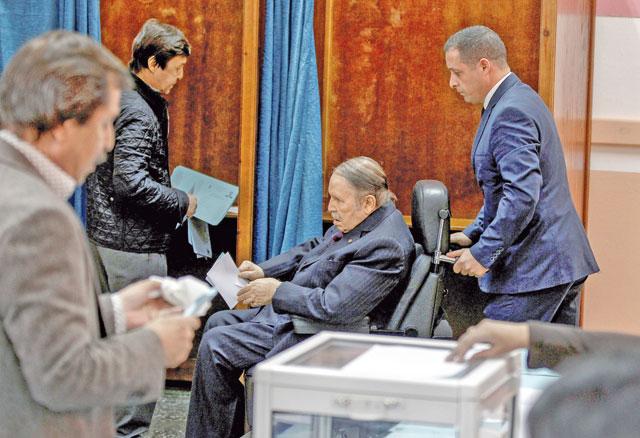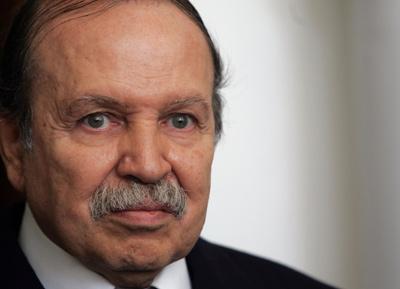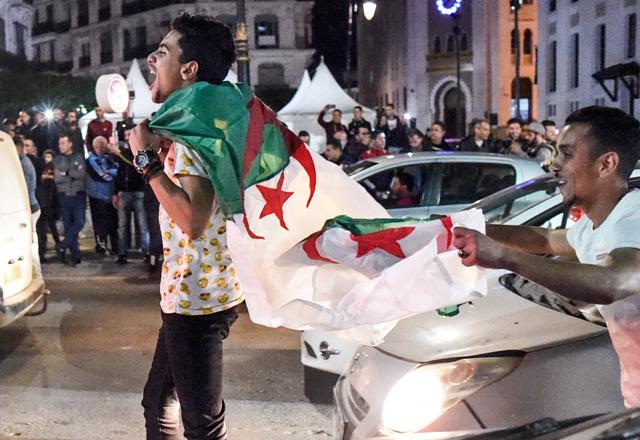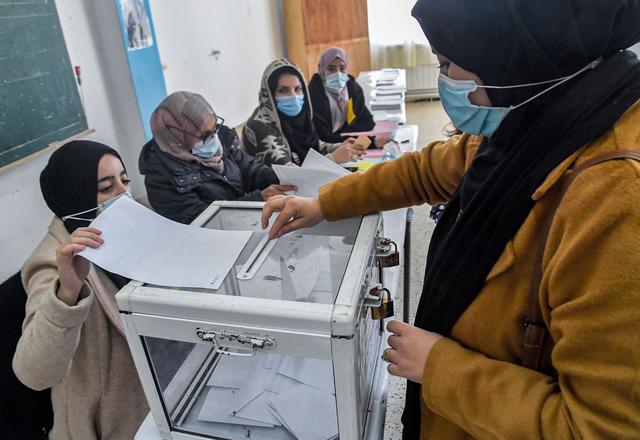You are here
Algeria’s ruling caste set on orderly succession, when the time comes
By Reuters - Dec 14,2017 - Last updated at Dec 14,2017

Algeria's President Abdelaziz Bouteflika holds his ballot as he leaves the polling station (Reuters photo)
ALGIERS — Algerians are facing the eventual departure of their long-serving president, the ailing Abdelaziz Bouteflika, in the knowledge that all is being done to ensure little changes when he goes.
The 80-year-old leader, who has ruled the North African country for nearly two decades, was incapacitated by a stroke in 2013 but may decide to run again in the next presidential election due in May 2019.
Should he bow out, though, many Algerians believe the person elected to replace him will be secondary. Just as now, observers say, a powerful ruling caste dominated by the army will run the show from behind the scenes.
That may be good news for an aged and thinning party elite from the Front de Liberation National (FLN), allied business tycoons and generals — collectively known as "Le Pouvoir" or "The Powers That Be" — that has long managed Algeria's politics.
It is a source of frustration, however, for young Algerians who have known no other leader. They worry less about who is in charge and more about jobs at a time of high unemployment, low oil prices and economic austerity.
For Samir Abdelaoui, who studies at a private English language school, leaving the country may offer the way out. "I don't care about politics, all I need is a decent job, if not here, then overseas. I want a visa, not a president," said Abdelaoui, who is learning English to increase his chances of getting a work visa abroad.
Speculation is rife abroad over what will happen to Algeria after the departure of Bouteflika, who has visited Europe several times for treatment and remained in hospital in France for months after his stroke. But inside Algeria, an apparent oasis of stability in a chaotic region, the regime's allies regard the problem as settled.
"After Bouteflika, the military command will organise the succession. The political class is weak here," said Anis Rahmani, chairman of Ennahar TV, an insider close to the authorities.
Haunted by wars
One liberal Algerian analyst also expected continuity. "The institutions in Algiers are stronger than the men. The men go but the institutions stay," the analyst said, requesting anonymity.
"The institutions are functioning well, whether Bouteflika is sick, in Algiers or abroad. As long as his health allows him to he will continue beyond 2018."
Hopes for the election of a reformist, modernising president who will bring in a competitive democracy and open society, have all but faded away. The priority, according to observers of Algeria's system, is the stability that its citizens see as incarnated in Bouteflika.
The former French colony, which freed itself in a brutal independence struggle that ended in 1962, is haunted by memories of a 1990s civil war that erupted after the state cancelled elections when an Islamist party appeared set to win.
That conflict killed 200,000 people, leaving many Algerians wary later of the unrest that toppled the leaders of Tunisia, Egypt and Libya in the "Arab Spring" revolts of 2011.
"Algeria is a country in a very bad neighbourhood and because we are in a bad neighbourhood the army should remain involved. I don't think the army would want to seize power after Bouteflika but they will be part of the political process," said another Algerian political analyst who also requested anonymity.
Disconnected youths
Young Algerians, who form two thirds of the population of 41 million, nevertheless feel left out and disconnected with a remote political class.
By contrast, French President Emmanuel Macron walked through the streets of Algiers on a visit last week and talked directly with excited young people — something they have not experienced with their own leader for a long time.
One of the analysts described the ruling class as "totally obsolete in a country of youths".
"We dream of a young class that has vitality, but the political class is not ready to give them one inch," said the analyst.
Bouteflika, in power since 1999, is rarely seen and has not spoken in public since his stroke. Yet if he or his circle decides he will run for a fifth term, sources close to "Le Pouvoir" say, he would be without doubt elected.
The ruling FLN and the pro-government National Rally for Democracy dominate parliament while the opposition including leftists and Islamists is weak and divided.
Maintaining social peace
If Bouteflika doesn't run, the tight circle of army generals and intelligence officials could produce a "joker" candidate from outside the political class. For now, though, the possible alternatives are all members of the old elite such as Prime Minister Ahmed Ouyahia or former premier Abelmalek Sellal.
Any succession scenario involving Said Bouteflika, the president's younger brother and a close aide, would be controversial as the military men do not favour hereditary rule, observers say.
Foreign diplomats say they expect the generals to arrange a smooth transition. Instead they worry more about how the country, which relies on oil and gas exports, will manage the state-controlled economy in an era of low energy prices.
The government spends about $30 billion a year to subsidise everything from basic foodstuffs and fuel to healthcare, housing and education. This system has helped to keep the social peace, but the government has failed to develop industries beyond the energy sector and is fiscally strapped.
Algeria has done little to encourage foreign investment despite the desperate need for jobs, and even less to ease visa restrictions or build hotels to attract tourists to its beaches, mountains and desert wilderness, all a short flight from Europe.
So far the uncontested success has been security. Even Western diplomats move freely without the convoys that accompany them in many other Arab capitals.
Still, remnants of Al Qaeda remain active and have declared allegiance to Daesh. A twin car bombing killed 67 in Algiers in 2007 and at least 38 hostages died when jihadis seized a gas plant in 2013.
The security services have also uncovered and infiltrated sleeper cells while Algeria has closed all its border crossings with Libya, Mali, Niger, Morocco and Mauritania, turning them into military zones to prevent jihadis scattered across the Sahel region from connecting with each other.
“The next president should be a strongman who will guarantee security because we are in a state of war against terrorism," said Rahmani. "There is an external threat. The borders are all on fire. The next president should have a military background, power and authority to decide."
Related Articles
ALGIERS — President Abdelaziz Bouteflika, a veteran of the war for independence who has ruled Algeria for two decades, is again fighting for
ALGIERS — Algerians took to the streets in celebration on Monday evening after ailing President Abdelaziz Bouteflika announced that he had a
ALGIERS — Algerians voted Saturday in local elections seen as key in President Abdelmadjid Tebboune's push to turn the page on the two-decad


















